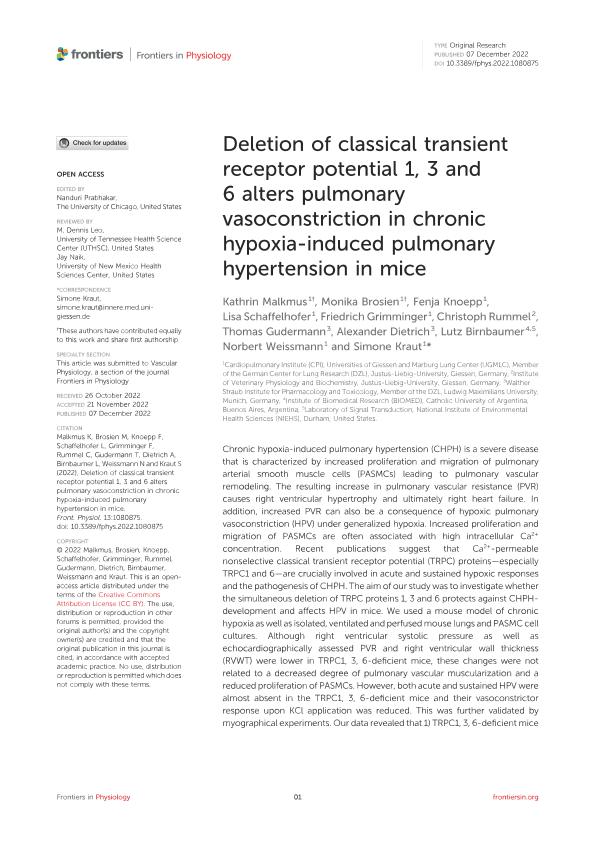Artículo
Deletion of classical transient receptor potential 1, 3 and 6 alters pulmonary vasoconstriction in chronic hypoxia-induced pulmonary hypertension in mice
Malkmus, Kathrin; Brosien, Monika; Knoepp, Fenja; Schaffelhofer, Lisa; Grimminger, Friedrich; Rummel, Christoph; Gudermann, Thomas; Dietrich, Alexander; Birnbaumer, Lutz ; Weissmann, Norbert; Kraut, Simone
; Weissmann, Norbert; Kraut, Simone
 ; Weissmann, Norbert; Kraut, Simone
; Weissmann, Norbert; Kraut, Simone
Fecha de publicación:
12/2022
Editorial:
Frontiers Media
Revista:
Frontiers in Physiology
ISSN:
1664-042X
Idioma:
Inglés
Tipo de recurso:
Artículo publicado
Clasificación temática:
Resumen
Chronic hypoxia-induced pulmonary hypertension (CHPH) is a severe disease that is characterized by increased proliferation and migration of pulmonary arterial smooth muscle cells (PASMCs) leading to pulmonary vascular remodeling. The resulting increase in pulmonary vascular resistance (PVR) causes right ventricular hypertrophy and ultimately right heart failure. In addition, increased PVR can also be a consequence of hypoxic pulmonary vasoconstriction (HPV) under generalized hypoxia. Increased proliferation and migration of PASMCs are often associated with high intracellular Ca2+ concentration. Recent publications suggest that Ca2+-permeable nonselective classical transient receptor potential (TRPC) proteins—especially TRPC1 and 6—are crucially involved in acute and sustained hypoxic responses and the pathogenesis of CHPH. The aim of our study was to investigate whether the simultaneous deletion of TRPC proteins 1, 3 and 6 protects against CHPH-development and affects HPV in mice. We used a mouse model of chronic hypoxia as well as isolated, ventilated and perfused mouse lungs and PASMC cell cultures. Although right ventricular systolic pressure as well as echocardiographically assessed PVR and right ventricular wall thickness (RVWT) were lower in TRPC1, 3, 6-deficient mice, these changes were not related to a decreased degree of pulmonary vascular muscularization and a reduced proliferation of PASMCs. However, both acute and sustained HPV were almost absent in the TRPC1, 3, 6-deficient mice and their vasoconstrictor response upon KCl application was reduced. This was further validated by myographical experiments. Our data revealed that 1) TRPC1, 3, 6-deficient mice are partially protected against development of CHPH, 2) these changes may be caused by diminished HPV and not an altered pulmonary vascular remodeling.
Archivos asociados
Licencia
Identificadores
Colecciones
Articulos(BIOMED)
Articulos de INSTITUTO DE INVESTIGACIONES BIOMEDICAS
Articulos de INSTITUTO DE INVESTIGACIONES BIOMEDICAS
Citación
Malkmus, Kathrin; Brosien, Monika; Knoepp, Fenja; Schaffelhofer, Lisa; Grimminger, Friedrich; et al.; Deletion of classical transient receptor potential 1, 3 and 6 alters pulmonary vasoconstriction in chronic hypoxia-induced pulmonary hypertension in mice; Frontiers Media; Frontiers in Physiology; 13; 12-2022; 1-15
Compartir
Altmétricas
Items relacionados
Mostrando titulos relacionados por título, autor y tema.
-
Musri, Melina Mara ; Coll Bonfill, Núria; Maron, Bradley A.; Peinado, Victor Ivo; Wang, Rui Sheng; Altirriba, Jordi; Blanco, Isabel; Oldham, William M.; Tura Ceide, Olga; García Lucio, Jessica; de la Cruz Thea, Benjamín Isaías ; Meister, Gunter; Loscalzo, Joseph; Barberà, Joan A. (American Thoracic Society, 2018-10)
-
Maritano Furcada, Joaquín; Castro, Horacio Matías; de Vito, Eduardo ; Grande Ratti, María Florencia; Posadas Martinez, Maria Lourdes ; Giunta, Diego Hernan; Vazquez, Fernando Javier; Ferreyro, Bruno Leonel (Wiley Blackwell Publishing, Inc, 2020-12)
-
Sosa-Estani, Sergio Alejandro ; Salomón, Oscar Daniel ; Gómez, Adolfo Orlando; Esquivel, María Laura; Segura, Elsa Leonor (Cadernos Saude Publica, 2001-12)



